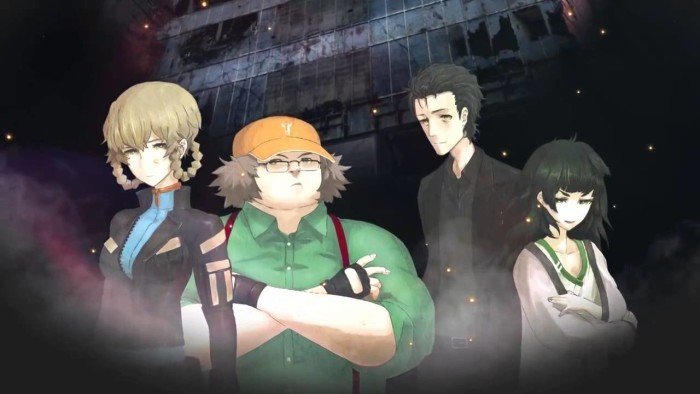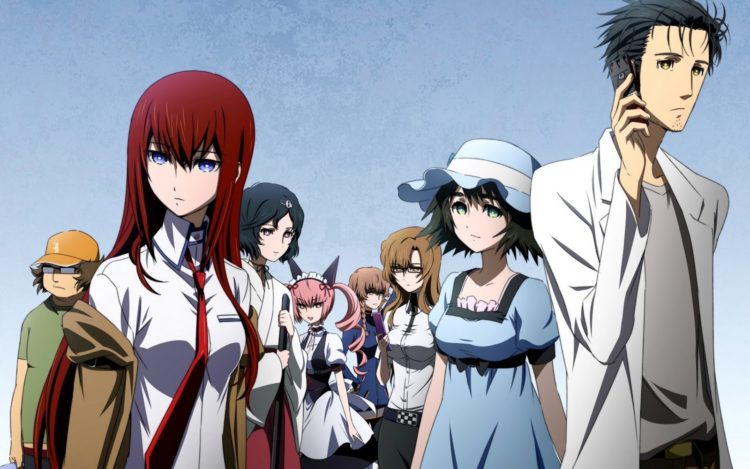Have you heard of Steins;Gate? It is one of the most successful time travel anime of all time, and one of the intriguing things is its name and mentioned words. With that in mind, in this article we will unravel the true meaning of Steins Gate and El Psy Congroo.
If you haven't watched the anime yet, run and watch it because it's the greatest experience you will ever have. If you've watched it, you know that Steins Gate is just a word invented by Okabe that mixes English and German, but with no apparent meaning. Really?
Table of Content
What does Steins Gate really mean?
In the anime, it is not shown, but in the original Steins;Gate game, in a certain dialogue and mentions of the game's name in Japanese, it makes a kind of wordplay.
The famous phrase This is the Choice of Steins;Gate in the game is written:
「これが運命石の扉(シュタインズ・ゲート)の選択か…」
Steins;Gate mentioned by Okabe is written [運命石の扉] which in Japanese literally means “the stone gate of fate”, but which reads furigana (in parentheses) [email protected].
The correct reading of the ideograms [運命石の扉] for this meaning would be something like "unmei-seki no tobira", but the wordplay did the following:
- 運命石 - unmei-seki - Stone of Destiny - Stein;
- 扉 - tobira - gate, portal - gate;
The first expression takes a German language word while the second takes an English language word, but both were correctly represented with Japanese language.
In a 2009 interview with news portal Dengeki Online, scenario writer Naotaka Hayashi said that "stein" has two origins.
The first is that “stein” is derived from Albert Einstein, whose theory of relativity plays a role in history. The second is that “stein” is the German word for “stone” in the term “stone of fate”.
Gate is an English word that usually means gate, but it can also refer to a door, portal or passage. Probably referencing the path from one timeline to another.
Stein's gate itself is a pseudo-term created by Okabe as part of his delusions of grandeur and has no real meaning in the real world.

What does Reading Steiner mean?
So does another term he came up with to reference Okabe's abilities to retain memory across timelines.
The term Reading Steiner in the Japanese game is written as [運命探知の魔眼] which literally means something like: Demon Eye of Destiny Detection.
It may seem strange to use ideograms for the creation of words with incorrect readings, but this really exists in the Japanese language and is called Ateji.
A great example of this is in the name of some countries. Brazil, for example, can be written using the ideograms [伯剌西爾] pronounced burajiru.

What does El Psy Congroo or Kongroo mean?
This is another jargon spoken by the Protagonist Okabe in which he says it has no special meaning. But if we analyze the word, can we find a meaning for El Psy Congroo?
El Psy Kongroo “is the password Okabe Rintaro uses whenever he ends a phone conversation pertaining to his crazy endeavors.
The expression possibly comes from a mixture of Spanish and Latin which means something like "The mind agrees" or "The mind is congruent".
The phrase El Psy Kongroo is a reference to the @channel meme "La Yohasoh Steana" and possibly something related to John Titor's real-world codeword, "Tempus edax rerum", meaning "Time, the devourer of all things. "
Despite the anime translating it as Congroo, the correct spelling is Kongroo, which can be seen in the scene where the video is received by Okabe via email [email protected] where the first five letters stand for Steins Gate El Psy Kongroo.

The Meaning of Operations at Steins Gate
In addition to the word Steins;Gate, in the protagonist Okabe's daydreams, he created several operations with strange names. Usually names of Norse Gods. What do you think of seeing the meaning of his operations?
The names of the three operations refer to three Nordic goddesses called Nornas who are born from the Urð spring (source of life) and lived protected by one of the branches of the Yggdrasill tree. These three goddesses are responsible for the destiny of people.
Operation Urd
This operation is mentioned between episodes 01 to 12. Its first appearance occurs in the presentation of the characters and in the learning to change the past with Microwave Telephone.
Urd according to Norse mythology refers to the goddess of the past. She was represented as the figure of a woman or a mythical being who lived in Uroarbrunnr, sometimes represented as a Valkyrie.
Operation Verdandi
Operation Verdandi takes place between episodes 13 to 22 where Okabe tries to undo all the D-mails in order to save Mayuri from death.
The Goddess Verdandi is the goddess of the present, or goddess of the event. She is a young woman who always looks to the present. It appears in the verses of the poem Edda.
Operation Skuld
The Skuld operation takes place between episodes 23 and 24 of the anime, where Okarin tries to change his future without changing his past in order to reach the Steins;Gate line.
Skuld is the goddess of the future, her name can also mean debt. Skuld, Verdanti and Urdu form the three goddesses of people's fate, her name also appears in Edda's poems as a Valkyrie.
